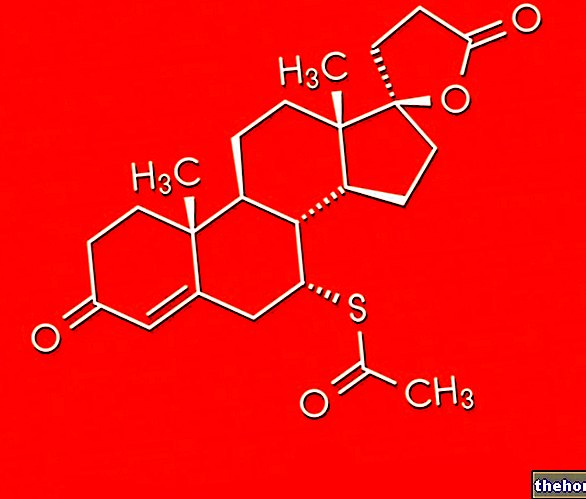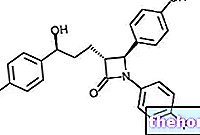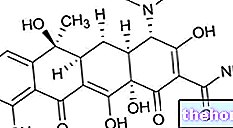Definition
Alcoholic steatosis is a particular form of hepatic steatosis (also known as "fatty liver"), due to the excessive consumption of alcohol. In fact, this pathology is found in 60-100% of heavy drinkers.
Fortunately, alcoholic steatosis is a reversible disorder.
Causes
Alcoholic steatosis is caused by the accumulation of triglycerides in the liver cells, caused by excessive and uncontrolled consumption of alcohol.
Further factors can also be added to favor the accumulation of triglycerides in the liver, such as, for example, obesity and a high-calorie and hyperlipidic diet.
Symptoms
The accumulation of triglycerides in the hepatocytes causes an increase in the volume of the liver itself, therefore causing hepatomegaly. The hepatomegaly, then, can give rise to signs of suffering from functional overload, such as pain in the right upper abdominal quadrant, nausea and elevation of the blood levels of hepatic transaminases.
In some cases - although rarely - alcoholic steatosis is associated with signs of cholestasis, which can be caused by the presence of gallbladder stones. This condition, in turn, can lead to the development of jaundice.
Finally, if not properly treated, alcoholic steatosis can become complicated in alcoholic hepatitis.
The information on Alcoholic Steatosis - Drugs for the Treatment of Alcoholic Steatosis is not intended to replace the direct relationship between health professional and patient. Always consult your doctor and / or specialist before taking Alcoholic Steatosis - Drugs for the Treatment of Alcoholic Steatosis.
Medicines
Fortunately, alcoholic steatosis is a reversible process that can be resolved by putting an end to the alcohol abuse that caused its development. It therefore appears clear that alcohol withdrawal is the main therapeutic approach for the treatment of steatosis. alcoholic.
However, especially in alcoholics, it is not always so easy to say enough to "alcohol", since in these individuals there is a real addiction that, often, cannot be countered with simple willpower.
At this point, therefore, the doctor can decide to prescribe drugs for the treatment of alcoholism, which can be accompanied by an adequate psychological support therapy.
In cases where the basis of alcoholic steatosis is not only the excessive consumption of alcohol, but also factors such as obesity and a high-calorie and hyperlipidic diet, then the doctor may decide to intervene by prescribing pharmacological treatments for this type of disorder as well.
In addition, when hepatic steatosis is associated with cholestasis due to the presence of stones in the gallbladder, the doctor may resort to the use of solubilizing drugs to dissolve the aforementioned stones.
In any case, the patient suffering from alcoholic steatosis will have to adopt a healthy lifestyle accompanied by a diet rich in vitamins and "lean" proteins.

Below are listed some types of drugs used in the therapy against alcoholic steatosis and some examples of pharmacological specialties; it is up to the doctor to choose the active ingredient and dosage most suitable for the patient, based on the severity of the disease, the state of health of the patient and his response to treatment.
Disulfiram
Disulfiram (Etiltox ®, Antabuse Dispergettes ®) is an adjuvant drug in the treatment of alcoholism. In fact, disulfiram does not cure alcoholism itself, but affects the metabolic degradation of alcohol within the body.
Through this interference, disulfiram is able to trigger unpleasant adverse effects in the patient who abuses alcohol, such as headache, nausea, dyspnoea, palpitations and vomiting. This should cause the individual to stop drinking the same alcohol. .
Usually, a dose of disulfiram equal to 800-1,200 mg per day, to be taken orally, is administered during the first 3-4 days of treatment. Subsequently, the dose is decreased to 200-400 mg per day, to be taken for a period not exceeding five months.
It should be remembered that disulfiram therapy can only be initiated in patients who have not consumed alcohol for at least 24 hours.
Naltrexone
Naltrexone (Nalorex ®) is an opioid receptor antagonist used in the alcohol cessation program. More specifically, this active ingredient is used to prevent relapses and promote alcohol withdrawal.
Naltrexone is available for both parenteral and oral administration. When administered via the latter route, the dose of drug generally used is 50 mg per day. The duration of treatment may vary from patient to patient, therefore, it will be determined by the physician on an individual basis.
Orlistat
Orlistat (Alli ®, Xenical ®) is an active ingredient with specific indications for the treatment of obesity and overweight. Therefore, its use is reserved for those patients in whom alcoholic steatosis is not only caused by excessive alcohol consumption, but is also favored by concomitant obesity.
It is a drug available for oral administration. The usual dose of orlistat is 60-120 mg of the active ingredient, to be taken three times a day just before, during, or immediately after a lipid-containing meal.
Ursodeoxycholic acid
Ursodeoxycholic acid (Deursil ®, Ursobil ®) is an active ingredient used to solubilize gallbladder stones. This drug, therefore, can be prescribed when alcoholic steatosis is associated with signs of cholestasis caused by the presence of gallbladder stones. .
Ursodeoxycholic acid is available for oral administration. The dose of drug usually used is 5-10 mg / kg of body weight, to be taken in 2-3 divided doses.
Other Alcoholic Alchermes Alcohol test Alcopops Cocktail Alcoholic Alcoholic units calculation Cognac Gin Grappa Alcoholic degree Grappa Limoncino Maraschino Marsala Nocino Prosecco Rum Rum Sherry Sparkling wine Spirits Wine Port wine Vermouth Vodka Vov Whiskey Categories Alcoholic foods Meat Cereals and derivatives Sweeteners Sweets Offal Dried fruit Milk and derivatives Legumes Oils and fats Fish and fishery products Cold cuts Spices Vegetables Health recipes Appetizers Bread, Pizza and Brioche First courses Second courses Vegetables and salads Sweets and desserts Ice creams and sorbets Syrups, liqueurs and grappas Basic preparations ---- In the kitchen with Leftovers Carnival recipes Christmas recipes Light diet recipes Women's, mom's and dad's day recipes Functional recipes International recipes Easter recipes Celiac recipes Diabetic recipes Holiday recipes Valentine's Day recipes Vegetarian recipes Protein recipes Regional recipes Vegan recipes























-nelle-carni-di-maiale.jpg)




